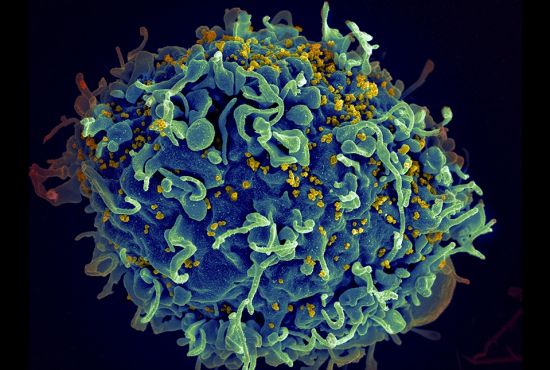New Lab Test to Detect Persistent HIV Strains in Africa May Aid Search for Cure
JULY 2, 2024

HIV particles, tiny yellow spheres, are attacking a CD4+ T cell shown in blue. The virus preferentially targets T cells, which play a critical role in the body's immune response against invaders like bacteria and viruses. Credit: Seth Pincus, Elizabeth Fischer and Austin Athman, National Institute of Allergy and Infectious Diseases, National Institutes of Health
A multinational team led by Weill Cornell Medicine investigators developed a test that will help measure the persistence of HIV in people affected by viral strains found predominantly in Africa—a vital tool in the search for an HIV cure that will benefit patients around the world.
The study, published in Nature Communications on July 2, helps fill a major gap in human immunodeficiency virus (HIV) research. Most HIV studies have focused on strains circulating in Western countries, predominantly in men who have sex with men affected by subtype B. Few studies have examined strains circulating in Africa, where women are disproportionately affected.
“HIV cure research tends to focus on viral strains circulating in developed countries, but to achieve a cure that is globally applicable, we must study viral strains that are affecting other regions of the world,” said lead author Dr. Guinevere Lee, assistant professor of virology in medicine in the Division of Infectious Diseases and assistant professor of microbiology and immunology at Weill Cornell Medicine.
The findings show—like other studies in developed countries—that HIV strains circulating in Africa establish viral reservoirs in the human body. Although antiretroviral therapy can reduce HIV in the blood to an undetectable level, these dormant reservoirs continue to survive. They contain a large number of defective proviral DNA genomes which can’t produce new infectious viruses, but a small number of proviruses remain genetically intact and ready to produce active viruses if antiretroviral treatment is interrupted.
The large proportion of defective viral genomes obscures researchers’ attempts to accurately quantify the intact proviruses. “We are looking for a needle in a haystack: To achieve an HIV cure, we need to first find out whether any genome-intact proviruses remain in the body during antiretroviral treatment. Our new assay allows us to do this. Then we need to target and eliminate the intact DNA capable of producing new viruses,” Dr. Lee explained.
Broadening the Lens of HIV Research with a New Assay
Dr. Lee and her colleagues analyzed DNA from immune cells called CD4+ T cells, where viral DNA hides, of 16 women and 7 men receiving antiretroviral HIV treatment in Uganda. Genetic sequencing of the virus revealed two predominant HIV-1 subtypes: A1 and D (a notoriously aggressive strain). The study also identified viral hybrids of A1 and D.
The team then modified existing laboratory tests that identify HIV subtype B proviruses to detect proviruses that are subtypes A1 and D. “The new assay we’ve developed will help researchers home in on the intact proviral genomes relevant to HIV cure research for patients affected by these under studied strains,” Dr. Lee said.
(left to right) Rose Magala and Samiri Jamiru from the Rakai Health Science Program, and Dennis Copertino, research scientist at Weill Cornell Medicine. The Ugandan scientists visited the Lee lab at Belfer Research Building to receive training on the new HIV assay.
Dr. Lee and her multinational, multi-institution collaborators are already using the new assay to study long-term viral persistence in Uganda. Their findings show that the composition of the HIV proviral genomic landscape is broadly comparable between subtypes A1, D and B suggesting that approaches to target intact HIV reservoirs in Africa will face similar “needle in a haystack” challenges as in North America and Europe. Future studies will also need to evaluate differences in non-B subtypes to understand whether subtype-specific factors impact persistence, reactivation or clearance in viral reservoirs.
Senior authors on the paper are Dr. Andrew Redd, National Institute of Allergy and Infectious Diseases at the National Institutes of Health (NIH), and Dr. Jessica Prodger, assistant professor, Departments of Microbiology & Immunology and Epidemiology & Biostatistics at Western University, London, Canada.
Researchers from Simon Fraser University, Canada; British Columbia Centre for Excellence in HIV/AIDS, Canada; Rakai Health Sciences Program, Uganda; University of Cape Town, South Africa; and Johns Hopkins University School of Medicine also contributed to this study.
The NIH is funding this work through the Research Enterprise to Advance a Cure for HIV (REACH) Martin Delaney Collaboratory, which is co-led by Dr. Brad Jones, associate professor of immunology in medicine in the Division of Infectious Diseases at Weill Cornell Medicine, and Dr. Marina Caskey, professor of clinical investigation at Rockefeller University and an adjunct professor of medicine at Weill Cornell Medicine and attending infectious disease physician at NewYork-Presbyterian/Weill Cornell Medical Center. The REACH Collaboratory is one of 10 NIH-funded collaborative research groups worldwide focused on finding an HIV cure.
This work was supported in part by the Division of Intramural Research, National Institute of Allergy and Infectious Diseases and NIH grants R21AI150398, R01AI162221 and UM1AI164565.
Dr. Brad Jones, Dr. Guinevere Lee, Infectious Diseases, Microbiology and Immunology, Research, News from WCM
Contact
Corinne Esposito
Media Specialist
Weill Cornell Medicine
External Affairs
1300 York Avenue
New York, NY 10065
coe4003@med.cornell.edu
Source: https://news.weill.cornell.edu/news/2024/07/new-lab-test-to-detect-persistent-hiv-strains-in-africa-may-aid-search-for-cure
"Reproduced with permission - Weill Cornell Medicine"
Weill Cornell Medicine
For more HIV and AIDS News visit...
Positively Positive - Living with HIV/AIDS:
HIV/AIDS News |